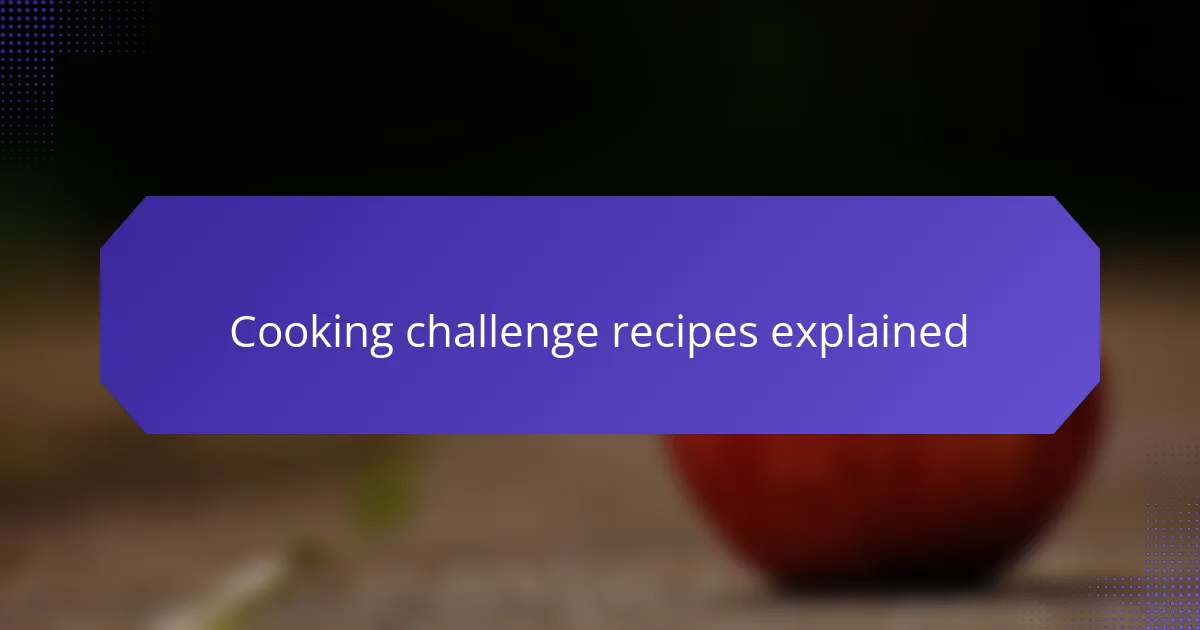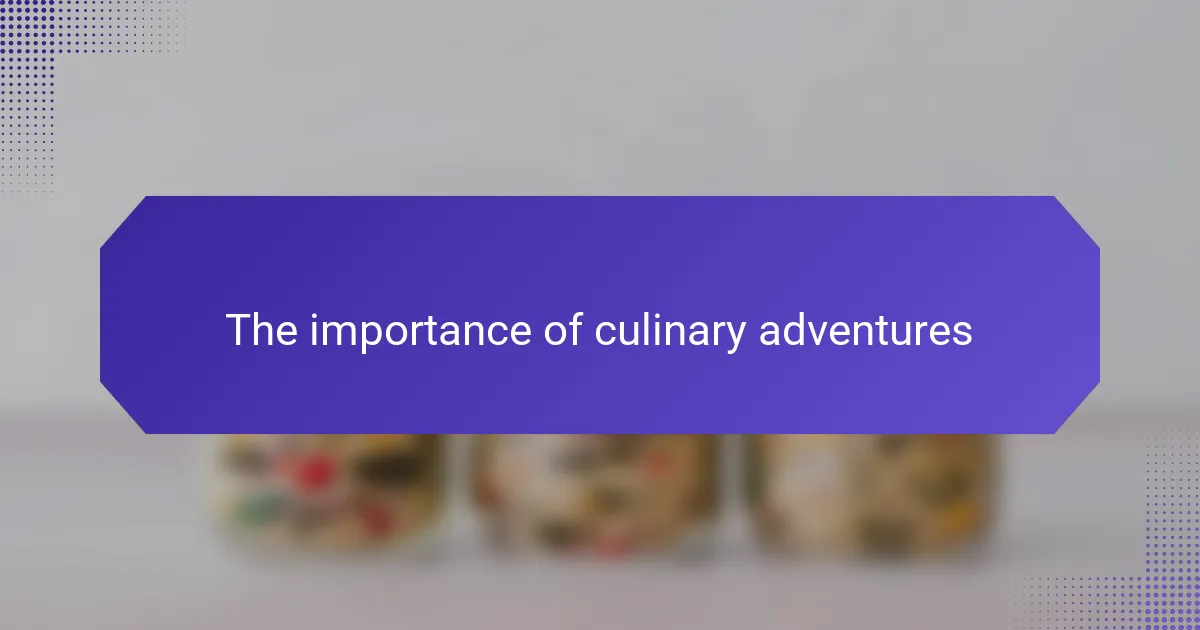Key takeaways
- Cooking challenges encourage creativity and exploration by using unfamiliar ingredients and themes.
- Culinary adventures deepen cultural connections and enhance personal growth through shared meals and new experiences.
- Key elements for successful cooking include embracing creativity, utilizing seasonal produce, and maintaining a positive attitude.
- Lessons from culinary experiences emphasize the importance of authenticity, learning from mistakes, and celebrating cultural diversity through food.

Cooking challenge recipes explained
Cooking challenges, just like Anthony Bourdain’s culinary adventures, are all about pushing your boundaries and exploring new flavors. I remember participating in a cooking challenge once where we had to use an ingredient we had never cooked with before. It was exciting and, frankly, a little nerve-racking, but the thrill of creating something totally unique made it worthwhile.
In essence, cooking challenge recipes encourage creativity and experimentation in the kitchen. Here are some key aspects to consider when diving into these culinary tests:
- Unfamiliar Ingredients: Try incorporating an ingredient you’ve never used before to expand your palate.
- Time Constraints: Set a timer to create dishes under pressure, just like Bourdain faced challenges abroad.
- Theme-Based Challenges: Choose a specific cuisine or cultural theme to explore different cooking techniques.
- Collaboration: Work with friends or family to share ideas and inspire each other, making the process more enjoyable.
- Feedback Loop: Taste and adjust your creations, channeling that adventurous spirit Bourdain embodied during his travels.
These challenges not only teach cooking techniques but also foster a sense of adventure and community.

The importance of culinary adventures
Culinary adventures are not just about trying new dishes; they are about experiencing cultures, unlocking creativity, and expanding your palate. I still remember the first time I stepped into a bustling market while traveling. The vibrant colors, the intoxicating aromas, and the friendly vendors beckoning to share their specialties ignited a passion in me that continues to influence my cooking today.
Embarking on culinary adventures fosters not only personal growth but also a deeper appreciation for the world around us. Here are some key benefits:
- Cultural Connection: Engaging with different cuisines deepens our understanding of various cultures, linking us to their histories and traditions.
- Creative Exploration: Trying out new ingredients and techniques challenges us to step outside our comfort zones and think freely in the kitchen.
- Community Building: Sharing meals from diverse backgrounds brings people together, nurturing friendships and creating unforgettable memories.
- Skill Development: Each culinary experience serves as a lesson, enhancing our cooking skills and broadening our culinary repertoire.

Exploring global cuisines
Exploring global cuisines is one of the most rewarding aspects of cooking, as it allows us to connect with cultures far beyond our own. I remember the first time I tried preparing a traditional Thai dish, inspired by Anthony Bourdain’s travels. The balance of flavors was so vibrant that it transported me to bustling markets filled with enticing aromas.
Bourdain’s adventures often centered around the idea that food is a gateway to understanding different cultures. Each dish he encountered was not just a meal but a story waiting to be told. For example, the simplicity of a bowl of ramen in Japan represented years of tradition and craftsmanship, reminding me of the importance of patience and dedication in cooking.
Here’s a comparison of a few global cuisines that Bourdain brought to life through his storytelling:
| Cuisine | Key Elements |
|---|---|
| Mexican | Bold flavors, fresh ingredients, and vibrant colors |
| Italian | Simplicity, seasonal produce, and regional variations |
| Japanese | Umami, meticulous presentation, and seasonal focus |
| Thai | Balancing sweet, sour, salty, and bitter flavors |
| Indian | Diverse spices, complexity of flavors, and culinary traditions |

Key ingredients in cooking challenges
When diving into cooking challenges, I’ve found that the key ingredients often extend beyond just what’s in your pantry. They embody creativity, adaptability, and a spirit of adventure. I remember the thrill of using unusual spices during an impromptu cook-off with friends; it wasn’t about perfection but rather about experimenting and trying new combinations. Those moments not only tested my culinary skills but also brought a sense of camaraderie and joy.
Here’s a quick breakdown of essential ingredients that can elevate your cooking challenges:
- Creativity: Embrace the unexpected; try combining flavors you wouldn’t normally pair.
- Seasonal Produce: Fresh ingredients can inspire new recipes and make cooking exciting.
- Basic Staples: Don’t underestimate the power of grains, legumes, and pantry essentials as foundation ingredients.
- Spices and Herbs: A dash of this or a sprinkle of that can transform a dish completely.
- A Positive Attitude: Approach each challenge with an open mind and a willingness to learn from mistakes.

Tips for creating your own challenges
Creating your own culinary challenges can be an invigorating experience, much like the adventures Anthony Bourdain embarked upon during his travels. I remember when I first attempted to recreate a dish from a place I had visited; it was exhilarating to bring those flavors back into my kitchen. Infusing personal memories into your challenges not only makes the cooking process enjoyable but also connects you to the food on a deeper level.
To get started with your culinary challenges, consider the following tips:
- Choose a cuisine or dish that resonates with a personal experience.
- Set a time limit to replicate the excitement of a restaurant meal.
- Incorporate seasonal ingredients for freshness and flavor.
- Challenge yourself with new techniques or equipment to expand your skills.
- Gather friends or family to share the experience and make it more social.
- Document your process to reflect on your growth as a cook.

My personal experiences with recipes
When I think about my personal experiences with recipes, I can’t help but reflect on the thrill of experimenting with new flavors, much like Anthony Bourdain did during his travels. I remember the first time I tried to replicate a dish inspired by him—a fragrant Thai curry. I was nervous but excited as the spices mingled, reminiscent of bustling street markets.
Cooking has become more than just a routine task; it often brings back memories of shared dinners with friends. I vividly recall tweaking a classic French onion soup recipe for a cozy gathering. The ingredients simmered slowly, filling the kitchen with a warmth that echoed Bourdain’s belief in the communal power of food.
- The joy of discovering a new spice and how it transforms a dish.
- The nostalgic feelings that arise when recreating family recipes.
- The thrill of sharing my culinary creations with friends and the conversations they spark.
- Learning from my mistakes in the kitchen, just as Bourdain embraced the unpredictability of life.
- Reflecting on the cultural stories behind each recipe and what they mean to me.

Lessons learned from Bourdain’s adventures
One of the most significant lessons from Bourdain’s culinary adventures is the importance of embracing cultural diversity through food. I remember vividly how his exploration of street food in countries like Malaysia made me appreciate flavors I had never encountered before. Those experiences reminded me that every dish has a story and a cultural context that enriches our understanding of the world.
Additionally, Bourdain’s honesty about the highs and lows of the culinary world taught me that authenticity is more valuable than perfection. Cooking isn’t just about following a recipe; it’s about expressing who we are through our choices in ingredients and techniques. When I reflect on my own cooking journey, I realize that the messiest meals often become the most cherished memories shared with loved ones.
- Embrace cultural diversity: Explore and celebrate different cuisines to broaden your culinary horizons.
- Value authenticity: Focus on genuine expression rather than striving for perfection in your cooking.
- Learn from failures: Recognize that mistakes can lead to personal growth and unforgettable experiences in the kitchen.


